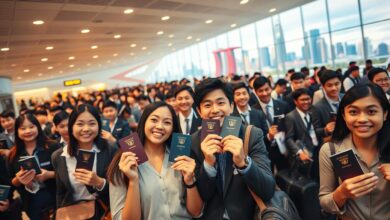The German Visa Sponsorship Process Explained
The German Visa Sponsorship Process is key for foreign workers wanting jobs in Germany. It’s important for applicants, especially from Nigeria, to know about it. This process helps them get into Germany’s skilled labor market.
Employers in Germany sponsor visas for workers. This involves legal and procedural steps. These steps are crucial for getting a visa and approval. It’s a big deal because it lets workers grow professionally in a strong economy.

What is Visa Sponsorship in Germany?
Visa sponsorship in Germany is key for people from outside the EU wanting to work there. It’s when an employer helps a foreign worker get a visa. This support is needed to meet legal rules and helps access Germany job opportunities.
Definition of Visa Sponsorship
Visa sponsorship means a German employer backs a foreign employee’s visa application. They make sure the employee can legally enter and stay in Germany. This is a big step for those moving to a new country.
Importance for Foreign Workers
This support is vital for foreign workers. It lets them find Germany job opportunities they might not see otherwise. Without a job in Germany, the immigration steps can be hard to follow. Visa sponsorship makes the application easier and proves the worker’s skills are needed in Germany.
Types of Visas That Require Sponsorship
In Germany, many visa types need a sponsor. This is for different needs of people from abroad. Knowing these visas helps understand the German Visa Sponsorship Process and the work visa process. These are key for those looking for jobs in Germany.
Work Visa
The Work Visa is popular for skilled workers. It lets people with special skills live and work in Germany legally. A German employer must offer the job and sponsor the visa, following local laws.
Getting the visa approved depends on meeting job requirements and qualifications.
Student Visa
The Student Visa is for international students wanting to study in Germany. Universities often sponsor students accepted into their programs. This visa lets students study and work part-time, helping them gain work experience.
Family Reunion Visa
The Family Reunion Visa lets family members of legal residents or German citizens move to Germany. It needs documents and sponsorship from the relative in Germany. This visa helps families stay together, strengthening personal and cultural ties.
Eligibility Criteria for Visa Sponsorship
The rules for visa sponsorship in Germany are key for foreign workers to find jobs. Employers and employees must meet certain standards. This makes the visa process smoother.
Requirements for Employers
Employers need to show they really need the worker’s skills. They must:
- Show there’s no one else in the local market who can do the job.
- Pay the salary set by German rules.
- Follow all labor laws and work conditions.
Requirements for Employees
Employees also have to meet certain criteria. They need to:
- Have the right qualifications for the job.
- Speak the language needed for work.
- Meet any extra requirements from the employer or the job.
The Role of the German Employer
Employers in Germany have big roles in visa sponsorship. They must know their employer responsibilities well. This is important for both the companies and the foreign workers looking for jobs.
Employers need to help a lot with this complex process. They must support and guide through it.
Understanding Employer Responsibilities
A German employer is the main sponsor for foreign workers. They must know their duties well. Companies have to make sure the work conditions meet German laws.
This includes checking job openings, making labor agreements, and paying fair wages. These steps are key to a strong application and a good work place for foreign staff.
Supporting Documentation Needed
To sponsor a foreign worker, employers need to gather supporting documentation. This includes:
- Proof of job vacancy, showing the position is real.
- Details of salary and work conditions that follow local laws.
- Proof of trying to hire from the European Union first.
Getting and giving the right supporting documentation is crucial. It makes the visa sponsorship process better. It shows the applicant’s qualifications clearly, helping to get approval faster.
Steps in the German Visa Sponsorship Process
The German visa sponsorship process has several key steps. These steps help ensure a smooth transition for foreign workers. It’s important for employers and employees to pay close attention to these steps for visa approval.
Initial Application Submission
The process starts with the employer applying to German authorities. They need to provide detailed information about the job, company, and employee’s qualifications. It’s crucial for employers to make sure all documents are correct and meet visa requirements.
Verification by Authorities
After applying, the authorities check the application carefully. They verify the information and documents. This step is important to see if the employer can sponsor a foreign worker, affecting visa approval.
Visa Approval Timeline
The time it takes to get a visa can vary. Applicants should be prepared for a detailed process. The timeline depends on the application’s completeness, the immigration office’s workload, and any extra requests. Knowing these factors helps manage expectations.
Gather Necessary Documentation
In the German visa sponsorship process, getting the right documents is key for both employees and employers. The documents needed must be carefully prepared. This helps speed up the visa approval and prevents delays. Knowing what each side needs greatly improves the sponsorship success rate.
Required Documents for Employees
Employees need to gather a variety of important documents. These usually include:
- A valid passport with enough space.
- Proof of qualifications, like diplomas and certifications.
- Employment offer letters that outline the job details.
- Curriculum Vitae (CV) showing work history.
Required Documents for Employers
Employers also have specific documents to fulfill their sponsorship duties. Important documents for employers are:
- Company registration certificates showing legal status.
- Proof of job postings to show the need for foreign workers.
- Payroll information proving financial stability and labor law compliance.
- Details about company size and operations.
Application Process for Visa Sponsorship
The visa sponsorship application process has several key steps. Both employers and employees must follow these steps carefully. Making sure every part of the application is accurate and complete is crucial. Knowing what the process involves helps everyone prepare better together.
Completing the Application Form
Getting the application form right is very important. All details must match the job, qualifications, and the employer-applicant relationship. Paying close attention to each section is vital. Any mistakes could cause delays or even rejection.
Interview Process
After submitting the application, an interview might happen. This is when the applicant’s skills and reasons for moving to Germany are checked. Interviewers look at the applicant’s professional skills and cultural fit in Germany.
The interview helps to strengthen the application. It shows how well the candidate might adjust to life and work in Germany.
Fees Associated with Visa Sponsorship
Knowing the costs of visa sponsorship is key for both applicants and employers. Different fees come up during the process. Being aware of these costs helps with budgeting through each step.
Application Fees
Application fees are a must in the visa sponsorship process. These fees change based on the visa type. Applicants should get ready for these costs before applying to avoid surprises.
Additional Costs to Consider
There are more costs besides application fees in the visa sponsorship journey. Some include:
- Document translation fees
- Health insurance premiums
- Legal assistance charges
Knowing these costs helps applicants make smart financial choices during the immigration steps.
Common Challenges in the Sponsorship Process
People going through the visa sponsorship process often face many challenges. These can make the immigration steps harder. But, tackling these issues early can make the application smoother and more successful.
Language Barriers
Language skills are key in the visa sponsorship journey. Many applicants find it hard to communicate well. This can cause misunderstandings or wrong interpretations of what’s needed.
This problem affects their talks with sponsors and officials. Improving language skills or getting help with translations can really help.
Documentation Issues
Having the right documents is crucial in the visa sponsorship process. Applicants often have trouble getting all the needed papers. This can cause delays or even mean their application is denied.
Common issues include missing documents or wrong information. It’s important to make sure all paperwork is complete and correct. This is key to success in the immigration steps.
Importance of Legal Assistance
Understanding the visa sponsorship process can be tough. Legal help is key to making it easier and ensuring you follow the rules. If you’re trying to get through this, talking to a lawyer might be a good idea.
When to Consider Hiring a Lawyer
There are times when you really need a lawyer’s help. For example:
- Encountering complicated legal requirements that are hard to get
- Facing challenges during application submission, which could slow things down
- Needing help with appeals if your application gets denied
Benefits of Legal Support
Legal support offers many benefits for the visa sponsorship process:
- Expert advice on compliance with sponsorship rules
- Assistance in preparing necessary documentation to avoid delays or mistakes
- Representation during legal proceedings, should the need arise
Timeline for Visa Processing
The visa processing timeline for Germany can change a lot. It depends on many things. People often ask about the average time it takes for visa sponsorship. This can be from a few weeks to a few months.
Knowing what affects this timeline helps applicants get ready for their trip to Germany.
Average Processing Time
Usually, the approval time for visa applications is between 4 to 12 weeks. This time varies based on the visa type and application details. For example, work visas might take longer than student or family visas.
Understanding these averages helps people know what to expect. It makes the visa sponsorship process clearer.
Factors Affecting Processing Speed
Several things can make visa processing faster or slower. These include:
- The current workload at consulates or immigration offices
- The completeness and accuracy of the submitted documentation
- Requests for additional information or clarifications from authorities
- External factors such as local holidays or administrative delays
Knowing these factors helps applicants set realistic expectations. Being prepared can make the waiting period smoother.
Post-Visa Approval Steps
After getting visa approval, several steps are key for a smooth move. You need to plan well, like finding a place to live and knowing about health insurance. Getting used to the local culture helps you adjust better to your new home.
Preparing for Relocation
Finding a place to live is crucial. You might rent short-term or find a long-term home. Also, getting health insurance is a must before you start working. It’s smart to look at different options and pick what’s best for you.
Learning about local customs also helps you fit in better. It makes your move to Germany easier.
Registering with Local Authorities
Registering with local authorities is a big step after you move. It makes you officially a resident and lets you access important services. Make sure to bring all your important documents to the registration office.
This ensures a smooth start to your life and work in Germany.


